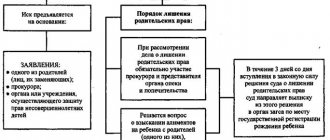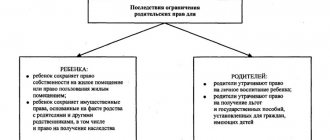A parent, when committing the actions specified in the list below, may be deprived through the court of parental rights to his child under 18 years of age. The claim is filed by the guardianship authority, orphanage, orphanage, another parent, prosecutor, trustee or guardian in connection with the following actions of the parent:
- Abuse of your rights in relation to a minor. It is expressed in instilling in a young child an immoral worldview, stopping actions aimed at the moral and physical development of the minor, forcing him to engage in prostitution, begging, and inducing him to use alcohol and drugs.
- Leaving a newborn in a maternity hospital, leaving a child in a school, shelter, orphanage, hospital without good reason.
- The father or mother is recognized as suffering from drug addiction or chronic alcoholism.
- Committing a criminal offense whose purpose is to cause harm to the physical well-being or life of another parent, other family members, a minor child or spouse.
- Malicious failure to pay funds under a child support obligation, the recipient of which is a child. This means concealing earnings from which alimony can be paid; lack of information about where the alimony worker lives; putting a parent on the wanted list due to lack of child support payments; initiating a criminal case due to non-payment of alimony or issuing a resolution according to which the defaulter is brought to administrative responsibility.
- Cruel treatment of their child, for example, when a parent deprives children of food or water necessary for their life, forces them to satisfy their sexual needs, tortures or beats children, and exercises psychological terror against them.
The court, having decided to release a parent from having parental rights over his children, deprives him of the following powers:
- Inheritance after the death of a child.
- Receiving all kinds of benefits and benefits that minor children are entitled to from the state.
- The child is released from the obligation to pay alimony in favor of the disabled or needy mother or father who are deprived of their rights to him.
- Be a representative under the law.
- Raise him, participate in his education, solve medical issues.
- Meet with the child.
- Living with a minor in the same dwelling.
The powers of the father or mother were indicated above, which they will lose when the judge terminates their parental rights. What will happen to their responsibilities? Is it necessary to pay child support after the termination of parental rights, or is the irresponsible parent exempt from this obligation? This will be written about in the next chapter.
The relationship between termination of parental rights and child support payments
Russian legislation clearly establishes that parents are required to provide financial support for their young children who are not yet 18 years old. The relationship is documented using a birth register and is duplicated in the birth certificate. Those. the woman and man recorded in this certificate are officially recognized as parents and bear the burden of providing for a young child.
It does not matter whether the child’s parents are legally married or not. This fact cannot in any way affect the entry about parents in the birth book. Therefore, the question that if one of the spouses was deprived of parental rights, whether he should pay alimony, does not matter in this situation. A spouse, former spouse or cohabitant is required to pay alimony if he is registered as the parent of a minor.
The only condition that allows you to sever a family relationship with a minor is his adoption by another individual. After this, the burden of maintaining the child passes to the adoptive parent. Even refusal to exercise the rights of a parent does not in any way affect the obligation to provide for a young child.
Rights of a child in relation to a parent deprived of rights
For a father deprived of parental rights, the fact of his participation in the life of the child completely ceases. The same cannot be said about the dependent himself. Even though the relationship between father and child ends completely, the child does not lose his rights. That is, he not only continues to receive financial support in the form of alimony until the age of 18 or more if the child is disabled, but also participates in inheritance rights on an equal basis with other relatives.
But as for the father, the situation here is not so favorable. Since he no longer has parental rights and this happened through his fault, he loses any opportunity to exercise other rights associated with having a child. This includes:
- the right to demand child support from an adult child when the parent becomes incapacitated;
- the right to inherit any property of the child as a result of his death is taken away from him;
- apply for any government benefits or programs that involve having children;
- a father deprived of parental rights is now prohibited from seeing a minor child without the permission of the mother or guardian, including taking any part in his upbringing.
Considering all of the above, it becomes clear that, despite the further continuation of alimony payments, the father loses any opportunity to exercise his rights in relation to the child. But as for the dependent himself, the situation is the opposite. Therefore, take a very responsible approach to the obligations assigned to you in raising and maintaining your child.
Procedure for calculating child support after deprivation of parental rights
During court proceedings, when it is necessary to decide whether to release a parent from his rights to a child or not, the issue of child support obligations is necessarily considered. Why is this being done?
- The court, according to Russian law, is obliged to promote the protection of children's interests, therefore, it must check that these interests are not violated.
- If the irresponsible parent has previously paid child support, the court must ensure that the amount of the child support payment is fair and reasonable and, if necessary, recalculate it. The alimony debt remains the same. If an irresponsible parent, for example, is in a formal marital relationship with the other parent, then by law he does not pay child support. However, as soon as he (she) is deprived of his rights, he is obliged to provide financially for the child with the help of alimony. Thus, in 100% of cases the court is obliged to study the alimony issue and make a correct and informed decision.
How can the issue of alimony be resolved? The solution options are described in the table below.
| Agreement | The court's decision |
It is concluded before a notary in the presence of both parents. The approximate price of the service is 5,000 – 10,000 rubles. Spouses independently determine:
| If the parent has official employment and a “white salary”, alimony is calculated as a share of the salary. The calculation procedure is as follows:
The above share sizes may be changed if the judge finds the following circumstances:
Collection of alimony benefits in the form of a fixed (flat) amount is applied when the parent:
Child support is calculated based on the child's subsistence level established by law in the Russian region in which the child is registered. In the event that a child’s subsistence level has not been established in the region, then the all-Russian subsistence level for children is used for calculation (RUB 10,181 in 2018). When determining the amount of alimony, the judge must proceed from the following criteria:
|
Procedure for forced collection of alimony
It is carried out only in the district court and simultaneously with the resolution of the issue of deprivation of parental rights. In this case, the plaintiff has the right to choose the court where the case will be heard, namely:
- At your own place of residence.
- At the place of registration of the other party.
According to Russian legislation, the plaintiff may be:
- Another parent.
- Prosecutor.
- Guardian.
- Guardianship authority.
- Head of the orphanage.
- Trustee.
- Head of the Commission on Juvenile Affairs.
- Adoptive parent.
It should be noted that a representative of the state guardianship agency and a prosecutor will participate in court hearings. This is due to the fact that deprivation of parental rights is a fairly serious measure of responsibility for a parent, which occurs for him in case of absolute neglect of the interests of the child. Therefore, the prosecutor must check whether there are signs of a criminal offense in the actions of the mother or father, and the state guardianship agency must examine the home in which the defendant lives, and himself, in order to have an idea of what principles and values he (she) is guided in life.
Proceedings in court cannot be started without a statement of claim. When writing it, you can use a sample, which can be viewed at this link. There is no need to request details from the court for paying the fee, since it is not paid by the plaintiff.
The proceedings usually take about 2 months, since the state guardianship agency should visit the homes of the defendant and plaintiff and prepare a reasoned opinion on the subject of the claims. In addition, the prosecutor also needs time to study the case for violations of the Criminal Code.
If the circumstances alleged by the plaintiff are confirmed, then the court deprives the defendant of the rights of a parent. If the deprived parent does not challenge the decision, then after 30 days from the moment it was written in final form, it comes into force. Next, the secretary of the court session prepares an extract from it and sends it within 3 days to the state civil registry office where the child’s birth was recorded. Based on the extract, the registry office changes the entry in the birth book, indicating that the father or mother’s parental rights have been terminated from a certain day.
Filing a claim in court
When filing a claim to request financial assistance from a mother or father deprived of parental rights to children, the legal representatives of a minor must be guided by the provisions of Art. 131 Code of Civil Procedure of the Russian Federation. Depending on the circumstances, the application form may vary. However, the content of the general sample necessarily includes the following items:
- The name of the judicial body to which the claim is sent.
- Personal information about the applicant and the child support obligee: last name, first name, patronymic of the parent deprived of rights to the child, residential address. In addition, it is recommended to indicate where and when the payer was born, as well as the place of work of the parent who lost the right to the child.
- A demand for the collection of alimony indicating the grounds for filing a claim (Article 80 of the RF IC) and clarifying the fact that the defendant has been deprived of parental rights.
- List of documents attached to the application.
- Signature of the plaintiff and date of registration.
An application for receiving alimony from a citizen deprived of parental rights must be submitted to the Magistrates' Court, if there are no related disputes other than establishing the amount of monetary support to provide for the needy offspring, and otherwise - to the office of the district court at the defendant's place of residence.
A sample application for child support from a parent who abandoned a child to a district court is available. The list of requested documents is specified in Art. 132 of the Code of Civil Procedure of the Russian Federation and is stated in the claim.
A sample application for filing a claim in the World Court can be downloaded on our website.
List of documents for filing a claim
It includes:
- Child's birth certificate or certificate of paternity. The judge needs them to determine who is the mother and father of a young child.
- Marriage certificate or divorce certificate.
- Certificate describing the composition of the family.
- Characteristics of a kindergarten teacher and a class teacher at school about the role both parents play in raising a child.
- Testimony from neighbors and relatives.
- The bailiff's decision on the existence of alimony debt, if any.
- An alimony agreement or a court decision to award alimony.
- Information about the other party’s income or place of work.
Do I have to pay child support if my child lives with me?
As a general rule, child support is paid by the parent of the child who lives separately from his children.
However, in judicial practice it often happens that one of the parents files an application to the court to collect child support, although the child has already been living with the other parent for some time. Such actions are considered justified and legal if there is arrears in paying child support for the period that the child lived with the other parent, for example with the mother.
Such a requirement is considered unconditional if:
- there is confirmation of the fact of the child’s residence with the mother (notarial consent or court decision)
- the mother bore the burden of supporting the child on her own (checks for children’s things, agreements with kindergarten, educational clubs)
If there is no agreement between the parents on the place of residence of the child, and this issue has not been resolved by the court, the parent who filed the request for payment of alimony must prove the fact of the child’s residence with him in court. To do this you will need to provide evidence:
- testimony of witnesses (relatives, neighbors)
- documents confirming the fact of living together with the child (checks, agreements)
- notarized correspondence
Arbitrage practice
The case was heard in the Novokuznetsk District Court of the Kemerovo Region in September 2021.
The application to the court was filed by the father of a minor child. He demanded that his mother be deprived of parental rights. The reasons for this, according to the father, were the following circumstances:
- The defendant often drank and for this reason did not raise the child.
- Several years ago she left the plaintiff and lives in a place unknown to him.
- During their cohabitation, the defendant often left home for several days, and when she returned, she demanded money for drinks, i.e. actually suffered from alcoholism.
- In addition, the child’s mother never worked, was never interested in her son’s affairs, academic success and health, did not buy him gifts, did not take part in parent-teacher meetings at school, etc.
All the time, counting from the moment of his son’s birth, the plaintiff took care of him: he took care of him, supported him, taught him, and monitored his development. His upbringing gave a positive result, which is confirmed by the excellent characteristics of the child from school.
Based on the examined case materials, the judge came to the conclusion that the defendant should be deprived of her parental rights for the following reasons:
- The state guardianship agency considers it necessary to terminate the defendant’s parental rights, since guardianship agency employees examined the house where the child’s mother lives and found it unkempt and abandoned. In addition, according to a survey of neighbors, the defendant is characterized negatively by them: according to them, she drank, did not go to work, did not take care of her son and left him to provide for her husband.
- The defendant, through her own fault, did not pay child support that was ordered by court order, and did not otherwise participate in meeting her son’s financial needs.
Liability for non-payment
If a father or mother, deprived of parental rights to their children, does not want to fulfill the obligations to support the child, then they can be held liable under Art. 115 RF IC. If a debt arises due to non-compliance with the provisions of the alimony agreement, the guilty person is punished in the manner established by this document. If the debt was formed due to a violation of a court decision, a penalty in the amount of 0.1% of the amount of unfulfilled obligations is charged for each day of delay.
Responsibility is also provided for under the Code of Administrative Offenses of the Russian Federation within the framework of Article 5.35.1:
- compulsory work up to 150 hours;
- administrative arrest from 10 to 15 days;
- a fine of 20 thousand rubles.
Also, an alimony-obligated person deprived of parental rights may be brought to criminal liability due to non-payment of alimony under Art. 157 of the Criminal Code of the Russian Federation, if he is recognized as a malicious evader from fulfilling his obligations. This status is assigned if:
- without good reason, does not want to comply with the provisions of the agreement or court decision regarding the financial support of the child;
- hides sources of income or property from bailiffs in order to protect property from foreclosure;
- systematically moves without notifying FSSP employees in order to avoid the need to pay alimony debts.
If a citizen who has lost the rights to a child is recognized as a malicious evader from paying alimony, then he is subject to the following penalties:
- correctional labor – up to 12 months;
- compulsory work – up to 12 months;
- arrest – up to 3 months;
- imprisonment – up to 12 months.
Note
In addition, it is necessary to take into account the costs that a child support defaulter who has been deprived of parental rights to a child will have to bear to participate in court proceedings and defend his own position. Also, the draft dodger will not be able to avoid public censure.
Regulatory framework
| Laws | Articles |
| Family code | Article 69 contains several grounds for the forced termination of the rights of an irresponsible parent in relation to a child. Article 70 establishes the specifics of the judicial procedure for deprivation of parental rights. Article 71 describes the negative consequences for a mother or father who has been denied rights to a child. Article 81 establishes the rules for claiming alimony in the form of a share of earnings. Article 83 establishes the rules for claiming alimony in the form of a fixed amount. Article 103 establishes the minimum amount of alimony allowance collected by agreement between the father and mother. Article 104 establishes the methods and frequency of alimony payments by agreement. |
| Tax Code (Part 2) | Article 333.36 establishes a list of benefits for paying court fees. |
| Civil Procedure Code | Section 23 contains categories of cases that a magistrate may deal with. Article 29 contains categories of cases in which the right to choose a court belongs to the plaintiff. |
Nuances
In court decisions and in the practice of alimony agreements in cases related to the provision of material support by fathers and mothers deprived of parental rights to their children, there are many different features and pitfalls that are important to consider when participating in the process of collecting payments:
- The best option to fulfill your child support obligations is to reach an agreement with the legal representative of the minor offspring. Actions through the court often result in additional costs and more serious consequences for parents deprived of their rights to their children.
- The presence of alimony debts requires more preventive measures than loan debts. Thus, the defaulter must take into account that if the amount accumulated due to non-payment of obligations exceeds 10 thousand rubles, a restriction on traveling abroad may be implemented in relation to the parent who has lost the rights to the child (Article 67 of Federal Law No. 229-FZ of 2007 ). In addition, you should remember the penalties mentioned above. Therefore, it is highly recommended not to ignore the obligation to pay alimony.
- You should not try to avoid interacting with bailiffs. The powers of FSSP employees make it possible to find any income and property of the debtor (Article 64 of Federal Law No. 229-FZ of 2007). If a parent deprived of rights to a child does not pay child support and ignores the bailiff’s attempts to seek help for the offspring, in the future such behavior may result in even greater losses for the violator. On the contrary, executors of a court decision to collect financial support for children should be assisted in every possible way. If it is not possible to transfer alimony, you should try to negotiate with the representative of the minor child or with the bailiffs on a deferment of payments.
In order to recover from a mother or father who has been deprived of parental rights to children, funds to meet the needs of their offspring, you need to study the intricacies of the process of claiming alimony, which requires a lot of time. An alternative way to obtain child support payments is to use the services of a lawyer. A specialist can help with defending your position in court and collecting evidence of claims.
Comments Showing 0 of 0









